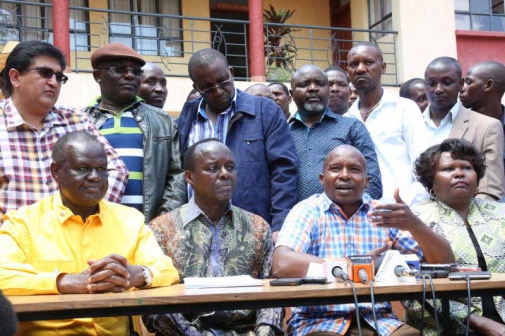Concerned Kenyans have been wondering why aspiring successors of President Uhuru Kenyatta and former Prime Minister Raila Odinga appear content to watch from the fringes as the politics of intra-party dictatorship is normalised.
The recent behaviour of senators who simultaneously praised Kithure Kindiki for his steady leadership while voting him out of his position as Senate Deputy Speaker was quite disgraceful. Is it our fate that we, ordinary Kenyans, must be held in the vicious grip of such leaders whose capacity for deceit is infinite?
Perhaps this question would be mundane if these shenanigans were limited to the National Assembly, where debt-ridden politicians do the bidding of their political party leaders for immediate survival.But they seem to be the stock in trade in whatever remains of Kenya’s public sphere, where influence peddlers engage in all forms of political brokerage. That, for me, spellsdoom for Kenya’s fragile democratic practices.
I think this is why we are still obsessed with the need for community spokespersons. Personally, I think this is an old-fashioned idea. There is a need to cultivate a broad-based understanding among ordinary Kenyans that the political culture of designating individuals as community spokespersons is retrogressive because it short-circuits democracy, denies voters a chance to elect the best of the candidates on offer, and saddles all of us with ineffective leaders who have, by hook or crook, ensured that they get these dubious titles.
More important, this culture is what recreates the numerous conspiracies that politicians hatch to keep the ordinary voter ignorant, sick and poor. Even when they purport to speak for a community or any other group of people, it is usually about the political class closing ranks to make it harder for other leaders to emerge. So we remain stuck with political deadwood.
This has been the plight of residents of western Kenya – Luhya and non-Luhya alike – since independence. It is also responsible for the rampant poverty and poor representation that the region has suffered despite its huge population, a significant proportion of which is highly educated and widely experienced.
For the sake of clarity, I am not opposed to the idea or ideal of Luhya unity, or the unity of the whole country at that. But I have huge reservations about the process by which this unity is achieved, and about how a community spokesperson, who is presumably that community’s political leader, emerges.
If we assumed, for a moment, that Kenyans from Central, Nyanza, the North Rift or Coast regions were united, we should begin by asking how they grew in unity. Obviously, it would not only be by loud anointment of their leaders by one single person, but perhaps also by augmenting such an anointment with efforts thatcause the people to coalesce around shared economic interests and resources.
If you think about it, the strong self-help habits in Central Kenya that led to equally strong cooperative movements for land buying and coffee growing, or even the concerns of land alienation in parts of the Rift Valley, did more to bring people together than mere public anointments of spokespersons.
In parts of Nyanza, the historic Luo Thrift and Trading Company associated with the Odinga family gave the immediate contributors something to rally around and, later on, valuable memories of the good old days to which many descendants of the pioneer investors aspire to return.
It is undeniable, of course, that these communities later had strong political figureheads, now cynically described by Deputy President William Ruto and his supporters as “dynasties”. But these were leaders who emerged from the bottom going up, earning grassroots validation before seeking and staking national acceptance.
If there is any need for a Luhya spokesperson, for instance, such a person will emerge naturally based on the people’s appreciation of his or her impact on their economic lives. Most likely, this will be a leader who guides them to change with the times; to stop lamenting about the collapsed sugar or paper industries – these are dead and will never resurrect – and start growing their economies based on food crops to banish starvation from the region because this also compounds the problems of disease, crime and fatalism.
Anyone who wants to be a community spokesperson should first focus onhow to boost the economic conditions of their people. Political stardom will automatically follow, even if only at community level.
The writer teaches at the University of Nairobi.


